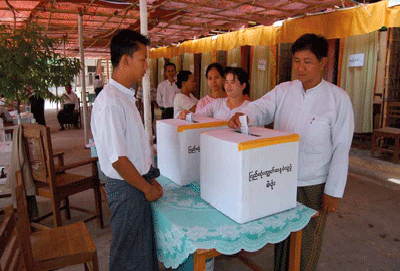Until today, political parties, which won in the 1990 general elections, and ethnic armed groups have criticized the 2008 constitution as hardly being suitable as a blueprint for Burma's future reform because it provides clear political advantage to the military, was drafted by the military regime, and it was approved in 2008 when many people struggled through the aftermath of Cyclone Nargis. The constitution also doesn't have any guarantee for ethnic rights.

Which articles in the 2008 constitution should be changed? Which points should be eliminated? What needs to be added? Those questions are vital to Burma’s future.
The Thein Sein government, which was established through the transformation of the former military regime to a (quasi) civilian government after the November 2010 election, under the provisions of the 2008 constitution, says the country is moving forward to become a modern democratic nation.
It is true that there are ethnic MPs and pro-democracy MPs participating in the Burmese Parliament. However, it is questionable how effective these MPs can be in their efforts for the sake of the Burmese people.
However, candidates from different pro-reform political parties running in the by-elections on April 1st are working hard to win seats as well.
The National League for Democracy (NLD), which won the majority in the 1990 general elections and boycotted the 2010 generational elections, is actively campaigning nationwide, contesting all 48 vacant seats in the by-election.
The NLD campaign platform calls for constitutional reform leading to the emerging rule of law, internal peace and “building a democratic nation,".
"The NLD party issued statement no.16/2008 in September 2008, before the military regime announced the referendum for approving the 2008 constitution. In the statement, we mentioned 12 points in the constitution which must be changed. We also called on the regime to change these points," U Ohn Kyaing, a CEC member of the NLD party and a member of the secretary team, said.
U Ohn Kyaing is running in Maha-Aung-Myay constituency, Mandalay region, in the by-elections.
"Mainly, we disagree that military appointees automatically took 25% of the seats in the parliaments. We suggest this point must be changed. We also disagree with the notion that the military must play a leading role in politics in the future, which is mentioned in the preamble of the constitution. This point also must be changed. It's is not a democratic way of selection. We suggest all must be equal," U Ohn Kyaing explained.
"The point that the Commander-in-Chief has authority to take control of country's power, also included in the constitution, should be changed," he continued.
There are 45 constituencies remaining in Sunday’s election after the UEC cancelled voting in 3 constituencies in Kachin State for security reasons. Even if the NLD wins in all constituencies, the party could have only a fraction of the seats required to seriously steer government policies. Political analysts observe NLD candidates cannot exercise any real influence in parliament with such a small number of seats.
According to the 2008 constitution (chapter XII, article 436), over 75% of MPs in the Union Parliament (both senate and lower house) must agree to make a constitutional amendment, which will then require a national referendum. The amendment will then require the support of over 50% of eligible voters.
"We hope we can amend the constitution. We will try our best to make it happen," U Ohn Kyaing said.
According to Col. Khun Oukkar, from the PNLO (Pa-O National Liberation Organization), ethnic rights and democratic protection of human rights are not included in the 2008 constitution.
"Actually, there are no ethnic rights, civil rights and democratic rights included in the constitution. This constitution was totally created for the military dictatorship. If I say there are no ethnic rights included in the constitution, many people will criticize me as a narrow minded person," Col. Khun Oukkar said.
"The idea that the military must play a leading role in national politics, written in Chapter I, Article 6 (f), must be taken out from the constitution. Others articles based on this principle must be taken out of the constitution," he said.
"If we cannot change the constitution, Burma cannot have genuine peace in the future and there will be more intense conflicts in the country, resulting in the continuation of civil war," he said.
The pro-democracy and reform minded MPs elected in 2010 will likely be joined soon by some reinforcements elected during this by-election, including Daw Aung San Suu Kyi, herself.
Though vastly outnumbered by their political opponents, their future and the future of the democratic reform movement in Burma seems to depend on their ability to lobby effectively for constitutional reform, in the parliaments and on the streets.



